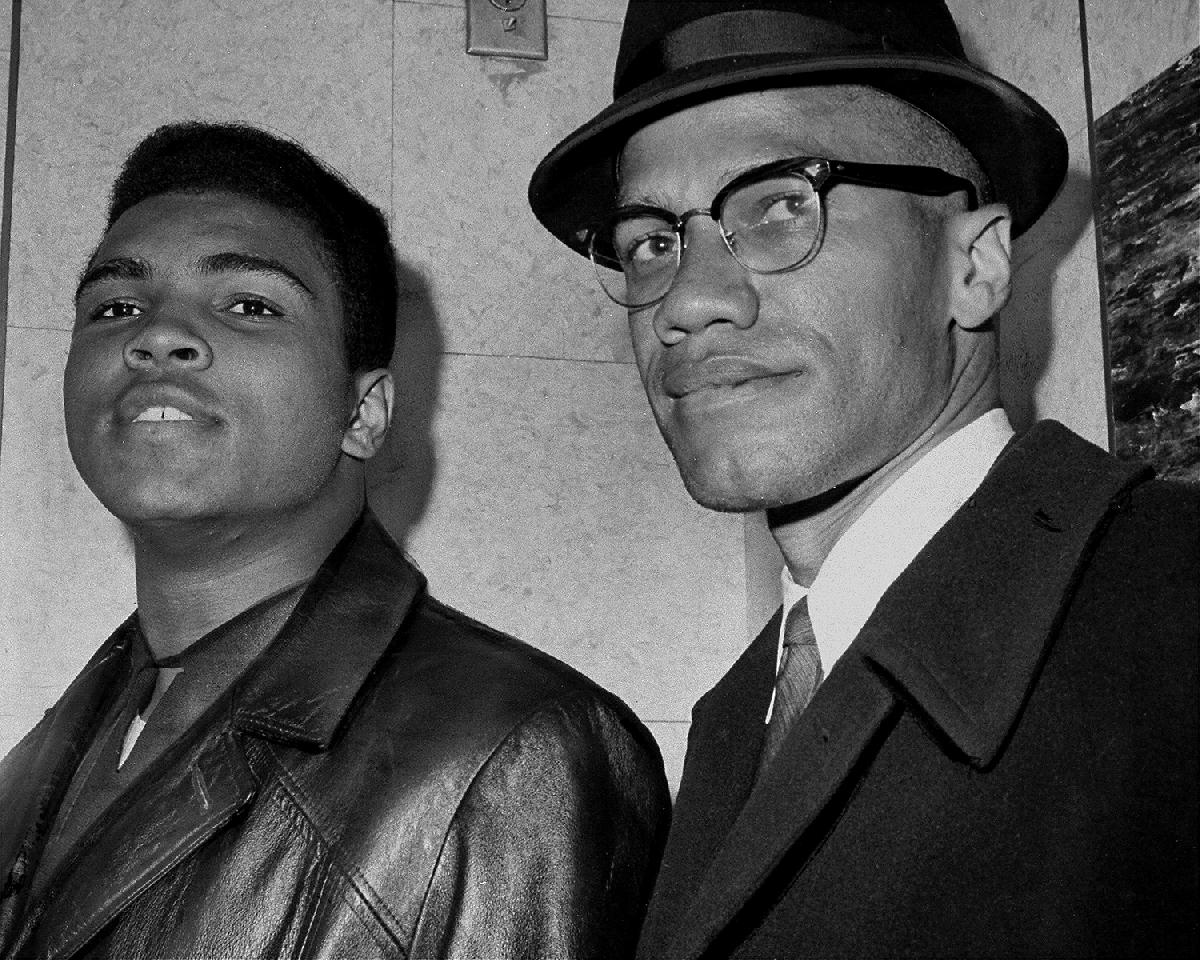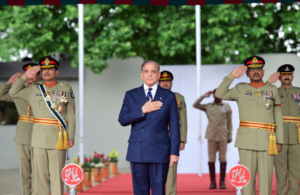
“I recall being at this event and I looked up and saw this really beautiful man,” says Malcolm X’s daughter Ilyasah Shabazz. She is talking about Muhammad Ali, who in this moment was rebuilding long-shattered bridges between the two once-inseparable families. “I asked him if he loved my father and he said he loved him with all his heart.”
Blood Brothers, Marcus A Clarke’s new documentary for Netflix, is about that previously unseen friendship between Ali and X. The boxer and the revolutionary, bound tightly by the tumult of the 1960s, became more than mentor and disciple and as close as the film’s title suggests.
There is no shortage of films, both fictional and factual, that have gone in search of a higher truth regarding the two titans of the 20th century. Just last year, Netflix itself released a miniseries entitled Who Killed Malcolm X? and Amazon distributed Regina King’s directorial debut One Night in Miami, which is set in the aftermath of Ali’s conquest of Sonny Liston for the world heavyweight championship. While there are films that depict the friendship of Ali and X, which only lasted three years, it is often scanned over or used as a footnote. Sometimes, the relationship is forgotten entirely, such as in Spike Lee’s three-hour-plus monumental biopic of Malcolm X, which makes no mention at all of Ali.
Clarke, who is sitting in his Los Angeles home in front of a rather fetching poster of Attack of the 50 Foot Woman, says his mission with the film was to dive deep into the stories of both men, what made them think, what made them feel and ultimately how they came to be enraptured with each other. He had a huge amount of resources at his disposal – the forensically researched book of the same name by Randy Roberts and Jonny Smith (who appear as talking heads throughout the film); some remarkable archival footage, much of which has never been seen before; and first-hand accounts from family members including X’s daughter, Ilyasah Shabazz, two of Ali’s daughters, Maryum and Hana, and Ali’s younger brother, Rahman, who like the late boxer, has been diagnosed with Parkinson’s.
“Marcus was focussed on the humanity of Malcolm and my father. I’ve never seen a film that focused on their friendship, on their morality and their compassion,” says Maryum Ali when I ask why her family trusted Clarke, who is best known for his documentaries about hip-hop, to make the film.
For Clarke, whose parents were immigrants from Jamaica and became New York schoolteachers, making Blood Brothers is the culmination of a childhood that emphasised education and learning, particularly of Black America and the Civil Rights struggle of the 20th Century: “Part of my foundation, my upbringing and how I was raised, was to know not just who Muhammad Ali and Malcolm X were but also Marcus Garvey and WEB Du Bois and what their sacrifices were.”
Clarke does not shy away from the fact he considers both men “heroes and inspirations” and believes directing the film to be the “biggest challenge of his career”. He felt responsible for both Ali and X and their respective legacies: “They are huge figures in the 20th century – they’re heroes to a lot of people. And so all of those factors, legacy, history, all those things were weighing on me. But it wasn’t intimidation, it was more like a sense of responsibility to do it right.”
The film also gave him the opportunity to contextualise the relationship between Ali and X, and how both of them became integral to the Civil Rights movement. Blood Brothers makes reference to X’s parents being followers of the Pan-Africanist Marcus Garvey, and a young Ali being deeply moved by the lynching of Emmett Till in 1955. Clarke also hypothesises that Ali’s experiences away from the segregated Jim Crow South at the 1960 Olympics in Rome – where he could be as free as any white man – were instrumental in him questioning the racism back home.
“I thought it was really important for people to understand where these men came from,” he says. “Knowing the upbringing of these men, where they came from, and what the temperature was in America, and that time between 1962 and 1965. You know, police brutality, discrimination was rampant. These are all elements that play into being Black in America, especially being a Black man in America.”
Access unlimited streaming of movies and TV shows with Amazon Prime Video Sign up now for a 30-day free trial Sign up
Blood Brothers also dangles various questions about the two men, none more so than the unsolved speculation around the assassination of Malcolm X. The Civil Rights leader, who could switch from giving out a loquacious lashing to being intensely vulnerable, was shot dead by three men who rushed the stage at Manhattan’s Audubon Ballroom while he was giving a speech. All three men who were convicted of the killing were members of the Nation of Islam, with whom X had come into a very public conflict after discovering improper behaviour by the organisation’s head, Elijah Muhammad. The FBI were also deeply embedded within the Nation, with the aim to undermine the fight for equality and exacerbate tensions between leaders. Indeed, John Ali, the National Secretary for the Nation of Islam at the time, is widely believed to have been an FBI informant, and met with one of X’s killers the night before the assassination.
Near the end of the film, Clarke asks the question: “What do you think happened to Malcolm X?” to various talking heads. During our interview, I ask him the same thing. “I think there were a lot of interests working against Malcolm and what he was trying to accomplish at that time,” he says. “He had made a significant amount of enemies, unfortunately, who wanted to slow him down. It’s hard to believe that there wasn’t some degree of collusion [between the Nation of Islam and the FBI].”
One of the men long suspected of being involved with the assassination is current head of the Nation Louis Farrakhan, who was then known as Louis X and previously had a career as a calypso singer. In a documentary that features figures from the religious organisation (one of whom ominously claims “Elijah Muhammad had people who would kill for him”), the absence of Farrakhan, who is one of the last few living figures to know both men personally and intimately, looms large.
Clarke says they did attempt to interview the 88-year-old religious leader, who was accused by X’s widow, Betty Shabazz, of being responsible for her husband’s murder: “His record, “A White Man’s Heaven is a Black Man’s Hell”, was influential in terms of catching Clay’s attention and bringing him in [to the Nation of Islam]. I did want his voice to contribute [to the film] but unfortunately that didn’t happen. We couldn’t schedule an interview.”
However, one of the central voices of the film belongs to Ilyasah Shabazz, X’s third-born child. A deeply moving moment comes when we see her as a baby on a beaming Ali’s lap the day the family went to visit him in camp for the first Liston fight. As is stressed in the film, the rightfully paranoid X would not have shared his children with a man he did not think of as a brother. Both men lived lives of upheaval, of chaos, but seeing their families beaming brightly brings a sense of peace before the storm.
Though she grew up without her father, Shabazz, who has inherited her father’s gift for oratory, had Malcolm’s spirit and ideals instilled in her from a young age: “My mother kept all of the stories and memories of my father alive for us by continuing conversations mostly about his humanity, his moral character, things he would like and things he would not approve of. And so those are the kinds of stories that we had in my household.”
When Malcolm found himself at a schism with the Nation after uncovering Elijah Muhammad’s rampant adultery, Ali found himself having to choose between his friend and mentor and the mission of his religion. He chose the Nation and harboured a fierce resentment for his former friend long after his assassination in 1965. In 1973, he told reporters, “Judas betrayed Jesus, like Malcolm X betrayed Elijah Muhammad.” To that, Clarke says, “This is years after Malcolm X is assassinated. He’s still holding onto this anger, this feeling of frustration. That anger turns into regret and then turns into remorse.”
It took until he left the Nation of Islam in 1975 for Ali to reconcile with the Shabazz family. Ilyasah says the Hall of Fame boxer, most notable for his victories over Liston, George Foreman and twice over Joe Frazier, told her: “[If I had] not met Malcolm, my epitaph would have read: ‘Here is the greatest boxer of all time.’ But because I met Malcolm, it would read so much more.”
She goes on to say that Ali was supportive of her family and and her personal efforts to keep bringing her father and his teachings to future generations through a series of children’s books based on Malcolm X’s life: “When I set out to write two of my books, I reached out to him, and he gave me support and some testimonials for my book. I don’t think there’s much of anything that we could have asked of him that he’d ever say no to.”
Maryum Ali has similar childhood memories of her father’s reverence for Malcolm: “He loved Malcolm and he did regret that it went the way it went. The kind of man he became had a lot to do with that friendship and the mentorship that Malcolm X provided for him.”
Both women also bristle at previous depictions of their fathers. Ali says, “I was not crazy about [One Night in Miami]. These two people are gone so they take liberties. They call it reimagining and I call it lying.”
Of the 1992 biopic, which starred Denzel Washington, Shabazz adds: “Spike Lee did a great job with but it wasn’t the complete story.” To her, the biggest benefit of that movie was that more people became interested in learning about her father. After its release, she says, “sales of Malcolm X’s books increased tremendously”.
When I ask what she most wants audiences to take away from Blood Brothers, Shabazz is forthright and biblical. It’s like listening to her father. “I want audiences to take away purpose, accountability and understanding the Day of Judgement. If we know that these kinds of injustices exist against our fellow brother and sister, and we do nothing, what does it say about us? If we know that these atrocities are happening, if we know that injustice exists, if we see someone dying, and we just step over and keep walking and do nothing about it, what does it say about you? What does it say about your morals, your values, your character?”
The most insightful moments of the documentary come from Rahman Ali, Muhammad’s only brother. A professional boxer in his own right, with a modest record of 14 wins and three losses, Rahman was by his brother’s side every step of the way and joined the Nation of Islam in 1964. Because Rahman is in ailing health, Clarke was dissuaded from talking to him and was told Rahman no longer “had his wits about him” after suffering a series of strokes and being diagnosed with Parkinson’s in 2017. But he was determined to find out for himself and in the process discovered the heart of his film. “After we got that interview, I knew pretty much exactly how I was going to tell the story. I was going to lean into the title, Blood Brothers. It’s poetic to have this double, triple entendre, if you will, of blood brothers. We know we’re talking about Malcolm X and Muhammad Ali but the most important insights you’re getting are from his actual blood brother.”
Clarke describes Rahman as “like a soldier”. “He’s in all the archival material. He’s right next to Muhammad Ali. He’s in between him and Malcolm many times.” It’s this closeness to the story that makes Rahman the most poignant voice to tell it. Clarke agrees: “He represents his brother in so many ways. As close as we can get today to Muhammad Ali.”
In many ways, Blood Brothers is Rahman’s story. “The interview is really powerful because it shows a range of emotions from Rahman,” says Clarke. “From admiration for Malcolm and for the relationship to the impact he had on his brother. But then when we get to the betrayal, you know, he still has anger and frustration.”
Half a century has passed since Malcolm X was assassinated, and Muhammad Ali was denigrated for converting to Islam and ostracised from his sport for expressing his political beliefs, but how much has America changed in that time?
“I’m sure that there are people who celebrate Muhammad Ali, and don’t celebrate Colin Kaepernick,” Clarke says of the NFL quarterback who was booed and condemned for taking a knee during the national anthem before games during the 2016/17 season, in a protest against racial inequality and police brutality. Then-president Donald Trump called on the NFL to fire Kaepernick and others who protested during the performance of the anthem. Kaepernick has not played in the NFL since the end of that season, with many believing he has been blackballed by the league due to his political views.
Maryum adds that her father was “very proud of Colin”. “He really respected Colin and admired him for [his protest]. [My father] realised everyone doesn’t have it within them to make that kind of stand but he was proud of Colin Kaepernick.”
Clarke is optimistic. He thinks things have moved on a great deal, especially attitudes towards Islam, even though former president Barack Obama was the target of a conspiracy theory spread by far-right demagogues that he was secretly a Muslim, and thus unfit to sit in the White House.
“I think Muhammad Ali ushered in a lot more acceptance of Islam,” Clarke says – but Maryum isn’t so sure. “There are people in this country who are exactly like, or maybe even worse than, people before the 1960s,” she suggests. “In some ways, African Americans have progressed by leaps and bounds. And in other ways, when you look at the poverty and segregated communities, and the lack of opportunity, in many ways, it’s worse.”
There’s been a reckoning in America since the death of George Floyd and the eruption of the Black Lives Matter protests. Many have attempted to address their biases and also come to acknowledge the fear young Black men face when confronted with law enforcement. It has Clarke ruminating on what would have happened if Malcolm X was still among us today: “It’s hard to watch the film and not wonder: ‘How would history be different if Malcolm X wasn’t assassinated at age 39?’ It’s the things he was dealing with and the things he was trying to address around police brutality and discrimination and having an active, disciplined, coordinated response to police brutality and to injustice against African Americans. Fifty-six years later, here we are with the George Floyd protests going on and America is erupting. We’re facing and dealing with the exact same issues that he had when he was alive.”
Ilyasah Shabazz sees America’s racist hierarchies as an educational issue, one that can be solved by learning about the past, in all its horror: “I think that people are misinformed on history generally. And it’s the reason why it seems that most of our leaders, most of our humane leaders, talk about the importance of education. I think that we need educational textbooks in a curriculum that teach not just Black children, but teach all children that Black history is American history which is world history. American history is also Hispanic history, Native American history, Asian history and there’s no American history unless each and every voice is heard on the pages of our textbooks. When we’re teaching children to hate others, we’re teaching them to hate themselves.”
Blood Brothers is an often moving tale that doubles as a rigorous historical document about two of the most significant figures to emerge out of the Civil Rights struggle. Maryum believes audiences can learn the lessons they need from the film to forge a better society: “This film shows two men who are actively in the lanes they were in to address the discrimination, the injustice, the oppression, and policy that’s needed to reverse that,” she says. “Take a page from their script, and apply that activism, and learn how you can be a catalyst for change.”
Blood Brothers is currently streaming on Netflix.






